Faculty Books
Five Star White Trash: A Memoir of Fraud and Family

Georgiann Davis
Her family was white, but not the right kind of white. They were five star white trash. They borrowed money and tried to buy class.
In this unflinching response to JD Vance's Hillbilly Elegy, Georgiann Davis guides us through her extraordinary life, from weighing almost 300 pounds by fifth grade, to dropping out of school in the seventh and on to selling weed out of her “monkey shit green” Plymouth Neon. A tall, fat girl who only wore boy’s clothing, she grew up with a turbulent family outside of Chicago: the larger-than-life mother who looked like Farah Fawcett, the father who understood cars better than children, the brother whose drug use went unchecked, and the Greek grandparents who could only love her from afar. Then there was the shocking medical secret kept from her–one that upended everything she thought she knew about herself, gender, and the human body.
With unflinching candor and dark humor, Davis tells her ‘stranger-than-fiction’ life story in a brave voice that will have readers rooting for her. As Davis chronicles her surprising journey from middle-school dropout to professor, she reveals how whiteness colored her family’s struggles. She connects her personal experiences of medical abuse, fatphobia, and fear of the intersex body with incisive critiques of whiteness, the opioid crisis, and gendered and queer oppression. Faced with unimaginable setbacks—identity theft, home eviction, medical trauma, and family betrayal—Davis relentlessly pursued education. It was this quest that transformed her life, giving her the tools to tell her own story. The result is a deeply moving memoir which complicates our understanding of upward mobility and familial love.
Slow Violence: Confronting Dark Truths in the American Classroom
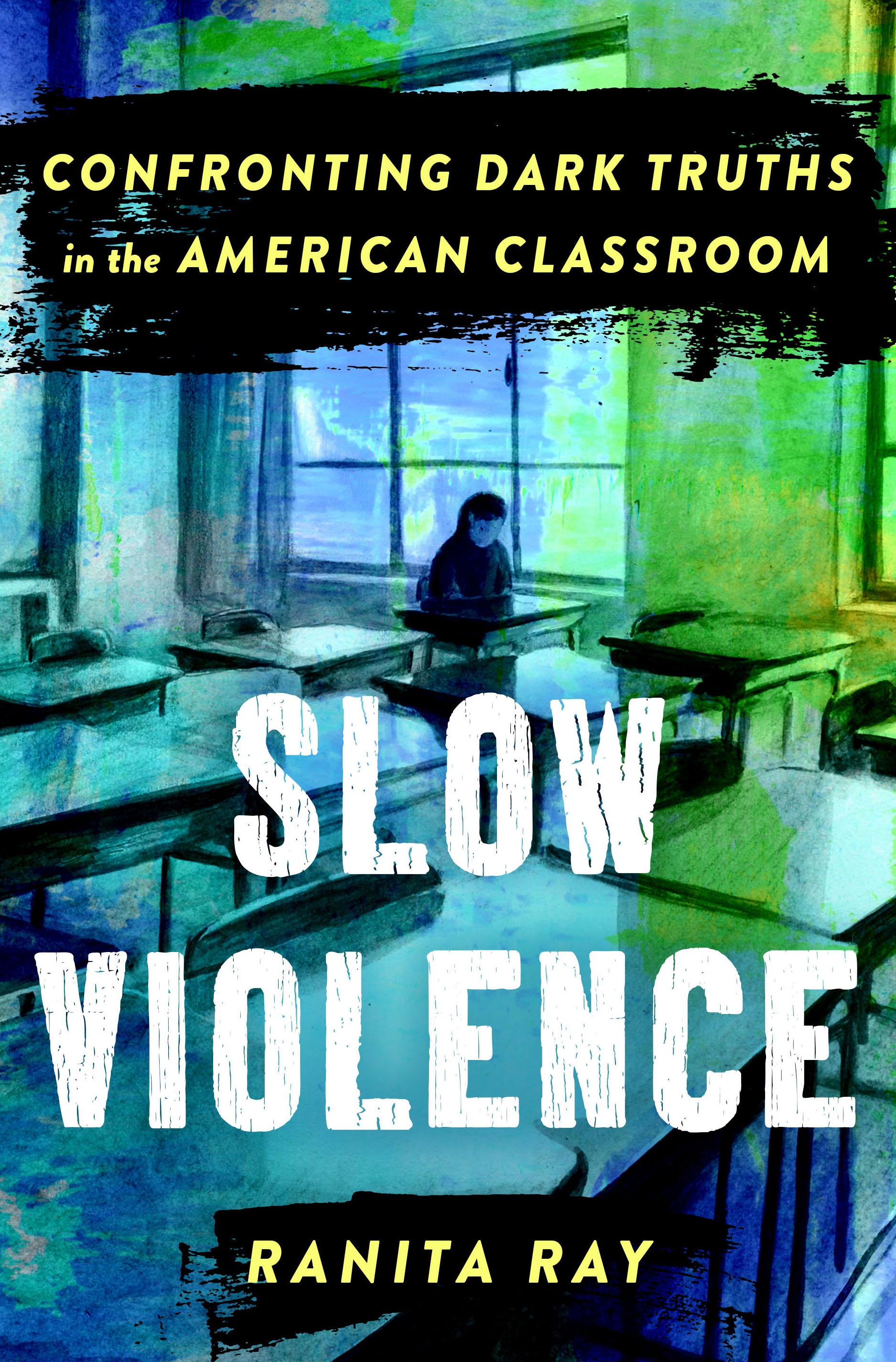
Ranita Ray
- Shortlisted for Columbia Journalism School and Nieman Foundation for Journalism at Harvard 's 2024 Lukas Work-in-Progress Prize
—Publishers Weekly
—Kirkus Reviews
"In Slow Violence, Ranita Ray manages to artfully and intellectually destroy the casual deployment of classroom "microaggressions" and "benevolent racism" opting instead to situate the brutality of our classrooms as slow, absolutely destructive violence. The book is a blending of what's possible when tenacious genius cultural workers take our educational past and future seriously."
—Kiese Laymon, Author of Heavy: An American Memoir
"At a moment when diversity, equity and inclusion are under attack and re-segregation is underway in American institutions, Ranita Ray’s urgently needed book critically examines an overworked, majority white teaching force from a rarely heard perspective: that of the majority non-white school children who fill America's (sometimes windowless) classrooms. With pathos, care, and the righteous fury its subject deserves, Slow Violence will move readers to tears and, hopefully, to action."
—Steven W. Thrasher, author, The Viral Underclass and former education reporter for the Village Voice
"A beautiful and aching book—at once a careful meditation on the hope we find in the eyes of our nation’s most vulnerable children, and a searing indictment of our failure to recognize their humanity...Ray shows us, in masterful strokes and through the eyes of children she followed, that teaching is a job, and that teachers are people who bring their gifts and biases into the classroom. [It] will change how you think about education."
—Reuben Jonathan Miller, author of Halfway Home
"Gripping and powerful...Ray's clear-eyed and full-hearted analysis shows how the precarity of public education—particularly in communities marginalized by systemic racism and economic injustice—can push teachers to punch down on kids and parents who are even more powerless than they are.”
—Jessica Calarco, author of Holding It Together
Black Feminist Interventions to Decolonize the Westernized University: Epistemology, Citational Justice, Research Methodology, and Pedagogy
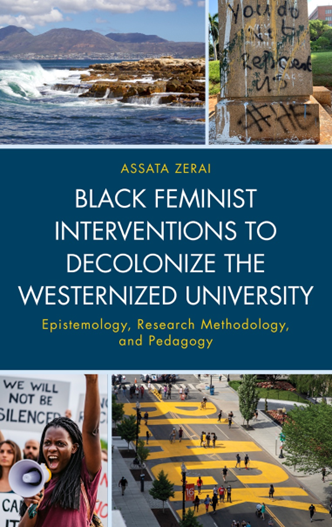
Assata Zerai
Decoloniality is a perspective that challenges the colonial foundation and neoliberal operations of the westernized university today. In Black Feminist Interventions to Decolonize the Westernized University: Epistemology, Research Methodology, and Pedagogy Professor Assata Zerai highlights feminist decoloniality as a tool to promote institutional transformation, indirectly through changes in research and teaching in the social sciences, directly by centering social justice within higher education. Reflecting on three decades of scholarship, Zerai adapts principles of decolonial theory to scholarship, pedagogy, and praxis transnationally, focusing on higher education in the USA and South Africa. She intentionally centers students who have been racially and culturally excluded in these contexts and provides evidence of university students experiencing intersectional microaggressions, including gendered, ableist, and queerphobic anti-Blackness. Zerai argues that faculty must appreciate such realities in order to affirm students and create learning environments in which all may thrive. Further, this book argues that ethical commitments to minoritized students and their communities must be reflected in humanizing research practices. Finally, Zerai reviews ways in which scholars have begun to move their disciplines from a focus on traditional canons of the modernist era to embrace decolonial sensibilities in their academic work. This book highlights these new approaches within the social sciences, to promote justice, equity, accessibility, diversity, and inclusion (JEADI) within higher education. Available for purchase here.
Handcrafted Careers: Working the Artisan Economy of Craft Beers
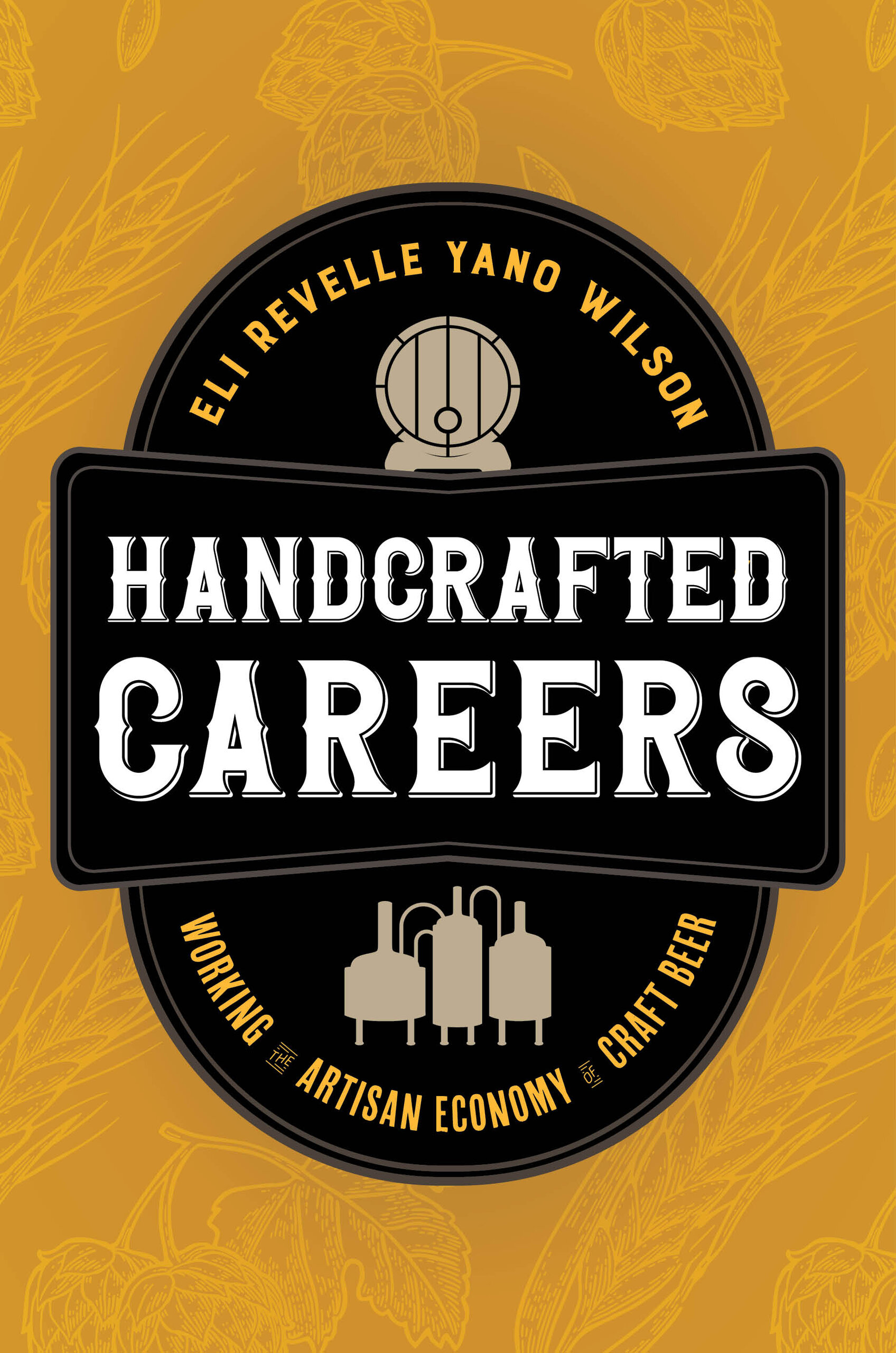
Eli Revelle Yano Wilson
As workers attempt new modes of employment in the era of the Great Resignation, they face a labor landscape that is increasingly uncertain and stubbornly unequal. With Handcrafted Careers, sociologist Eli Revelle Yano Wilson dives headfirst into the everyday lives of workers in the craft beer industry to address key questions facing American workers today: about what makes a good career, who gets to have one, and how careers progress without established models.
Quantcrit: An Antiracist Quantitative Approach to Educational Inquiry

Nichole M Garcia, Nancy Lopez, Veronica N. Velez
Garcia, N. M., López, N., & Vélez, V. N. (Eds.). (2023). QuantCrit: An Antiracist Quantitative Approach to Educational Inquiry. London: Routledge.
QuantCrit 20% Off
Justice by the Numbers Flyer: Advancing QuantCrit for Anti-Racist Quantitative Research
On Revolutions: Unruly Politics in the Contemporary World
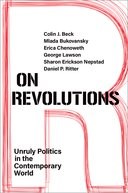
Sharon Erickson Nepstad, Colin J. Beck, Mlada Bukovansky, Erica Chenoweth, George Lawson, Daniel P. Ritter
On Revolutions integrates insights from diverse fields—civil resistance studies, international relations, social movements, terrorism—to offes new ways of thinking about the study of revolution. Conventional lines of thought draw on a number of categorical distinctions: social versus political revolutions, structure versus agency, violent versus nonviolent strategies, domestic versus international factors, and success versus failure. In contrast, the book outlines an approach that reaches beyond these dichotomies. Revolutions are not just political or social—they feature many types of change. Structure and agency are not mutually distinct—they are mutually reinforcing processes. Contention is not just violent or nonviolent—it is a messy process that usually involves both strategies. Revolutions do not just succeed or fail—they achieve and simultaneously fall short. And causal conditions are not just domestic or international—they are dependent on the interplay of each. The merit of this approach is demonstrated through consideration of a wide range of cases. The volume also explores new opportunities for conceptual thinking about revolution, provides methodological advice, and engages with the ethical issues that exist at the nexus of scholarship and activism. Taken together, these innovations chart a new path for revolution studies.
Beer and Society: How We Make Beer and Beer Makes Us
Eli R. Wilson and Asa B. Stone
Beer and Society: How We Make Beer and Beer Makes Us takes readers on a lively journey through the social, cultural, and economic dimensions of the modern beer world. This book illustrates that beer is far more than a beverage. As a finely-crafted cultural product, beer can be a part of our identity, a source of pleasure and camaraderie, an object of connoisseurship, and a livelihood for those who are behind the beer itself. Drawing on leading sociological and psychological perspectives, the authors argue that our enduring relationship with beer reflects the very roots of our society, including its collective values and norms, power structures, and persistent inequities based on race, gender, sexuality, and social class. Beer and Society explores beer as an embodiment of who we are and a force to energize social change.
Wilson, Eli R. and Asa B. Stone. 2022. Beer and Society: How We Make Beer and Beer Makes Us. Rowman & Littlefield.
Available for purchase here.
Front of the House, Back of the House: Race and Inequality in the Lives of Restaurant Workers
Eli Wilson
Two unequal worlds of work exist within the upscale restaurant scene of Los Angeles. White, college-educated servers operate in the front of the house—also known as the public areas of the restaurant—while Latino immigrants toil in the back of the house and out of customer view.
In Front of the House, Back of the House, Eli Revelle Yano Wilson shows us what keeps these workers apart, exploring race, class, and gender inequalities in the food service industry.
Drawing on research at three different high-end restaurants in Los Angeles, Wilson highlights why these inequalities persist in the twenty-first century, pointing to discriminatory hiring and supervisory practices that ultimately grant educated whites access to the most desirable positions. Additionally, he shows us how workers navigate these inequalities under the same roof, making sense of their jobs, their identities, and each other in a world that reinforces their separateness.
Front of the House, Back of the House takes us behind the scenes of the food service industry, providing a window into the unequal lives of white and Latino restaurant workers.
Front of the House, Back of the House was awarded 'Outstanding Academic Title' by Choice Magazine in 2021 along with recieving an honorable mention from Komarovsky Book Award from the Eastern Sociological Society.
Available for purchase here.
On the Heels of Ignorance: Psychiatry and the Politics of Not Knowing
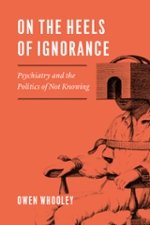
Owen Whooley
Winner of the 2020 Robert K. Merton Outstanding Book Award from the American Sociology Association, Section on Knowledge, Science and Technology
Honorable Mention, 2020 Eliot Freidson Outstanding Publication Award from the American Sociological Association, Section on Medical Sociology
Psychiatry has always aimed to peer deep into the human mind, daring to cast light on its darkest corners and untangle its thorniest knots, often invoking the latest medical science in doing so. But, as Owen Whooley’s sweeping new book tell us, the history of American psychiatry is really a record of ignorance. On the Heels of Ignorance begins with psychiatry’s formal inception in the 1840s and moves through two centuries of constant struggle simply to define and redefine mental illness, to say nothing of the best way to treat it. Whooley’s book is no antipsychiatric screed, however; instead, he reveals a field that has muddled through periodic reinventions and conflicting agendas of curiosity, compassion, and professional striving. On the Heels of Ignorance draws from intellectual history and the sociology of professions to portray an ongoing human effort to make sense of complex mental phenomena using an imperfect set of tools, with sometimes tragic results.
Available for purchase here.
Catholic Social Activism Progressive Movements in the United States
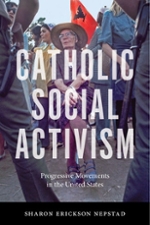
Sharon Erickson Nepstad
Many Americans assume that the Catholic Church is inherently conservative, based on its stances on abortion, contraception, and divorce. Yet there is a longstanding tradition of progressive Catholic movements in the United States that have addressed a variety of issues from labor, war, immigration, and environmental protection, to human rights, women’s rights, exploitive development practices, and bellicose foreign policies. These Catholic social movements have helped to shift the Church from an institution that had historically supported incumbent governments and political elites to a Church that has increasingly sided with the vulnerable and oppressed.
This book provides a concise history of progressively oriented Catholic Social Thought, which conveys the Catholic Church’s position on a variety of social justice concerns. Sharon Erickson Nepstad introduces key papal encyclicals and other church documents, showing how lay Catholics in the United States have put these ideas into practice through a creative and sometimes provocative political engagement. Nepstad also explores how these progressive movements have pressured the religious hierarchy to respond to pressing social issues, such as women’s ordination, conscription, and the morality of nuclear deterrence policies.
Catholic Social Activism vividly depicts how these progressive movements have helped to shape the religious landscape of the United States, and how they have provoked controversy and debate among Catholics and non-Catholics alike.
Available for purchase here.
African Women, ICT and Neoliberal Politics: The Challenge of Gendered Digital Divides to People-Centered Governance
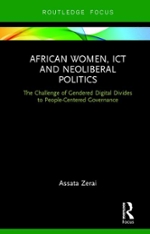
Assata Zerai
How can we promote people-centered governance in Africa? Cell phones/ information and communications technology (ICT) are shown to be linked to neoliberal understandings of more democratic governance structures, defined by the Worldwide Governance Indicators as: the rule of law, corruption-control, regulation quality, government effectiveness, political stability/no violence, and voice and accountability. However, these indicators fall short: they do note emphasize gender equity or pro-poor policies.
Writing from an African feminist scholar-activist perspective, Assata Zerai emphasizes the voices of women in two ways: (1) she examines how women's access to ICT makes a difference to the success of people-centered governance structures; and (2) she demonstrates how African women's scholarship, too often marginalized, must be used to expand and redefine the goals and indicators of democratice governance in African countries.
Challenging the status quo that praises the contributions of cell phones to the diffusion of knowledge and resultant better governance in Africa, this book is an important read for scholars of politics and technology, gender and politics, and African Studies.
Available for purchase here.
Safe Water, Sanitation and Early Childhood Malnutrition in East Africa: An Africana Feminist Analysis of the lives of Women and Children in Kenya, Tanzania and Uganda

Assata Zerai
Brenda N. Sanya
To understand safe water and sanitation in East Africa, it is important to consider the contributions of African feminist analysis. This perspective will unveil inequities in the distribution of resources, demonstrate how localized solutions which are driven by women’s collaborative work have had an impact by temporarily easing the burden, and paint a multilayered picture of the lives of women and girls who are the predominant providers of water to households. This book explores the effects of water and sanitation quality and availability on early childhood morbidity in East Africa from an African feminist sociological perspective. It presents a framework that considers the ways that the development industry, neoliberalism, neocolonial relations, gender, class, ethnicity, globalization, and other dimensions of oppression intersect to impact upon the experiences and agency of women and children accessing clean water and safe sanitation and reducing early childhood morbidity in Kenya, Tanzania and Uganda. This work offers a vital contribution to the social scientific literature by adapting the vibrant intellectual work of African feminists to a quantitative methodology and enlarging the scope of empirically and theoretically grounded studies within the field of environmental sociology.
Available for purchase here.
The Making of a Teenage Service Class
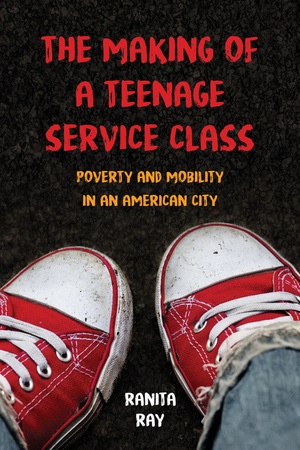
Ranita Ray
Winner of the 2018 C. Wright Mills Award from the Society for the Study of Social Problems
Winner of the 2020 Distinguished Scholarship Award from the Pacific Sociological Association
Honorable Mention, 2019 Distinguished Contribution to Scholarship Book Award from the American Sociological Association, Section on Race, Gender, and Class
Finalist, 2020. Bourdieu Best Book Award from the American Sociological Association, Section on the Sociology of Education
In this book Ray challenges common wisdom that focusing on "risk behaviors" such as drug use, gangs, violence, and teen parenthood is the key to ameliorating poverty in Black and brown communities. Instead, she shows how this strategy unleashes racialized class violence on Black and brown youth. Ray recounts the three years she spent with sixteen economically marginalized young Black and brown people, documenting their struggles to balance school and work while keeping commitments to family, friends, and lovers. Hunger, homelessness, untreated illnesses, and long hours spent traveling between work, school, and home disrupted their dreams of upward mobility. While families, schools, nonprofit organizations, academics, and policy makers stress risk behaviors in their efforts to end the cycle of racialized poverty, Ray argues that this strategy is itself racist and reproduces racialized class hierarchies.
Available for purchase here.
Intersectionality in Intentional Communities: The Struggle for Inclusivity in Multicultural U.S. Protestant Congregations
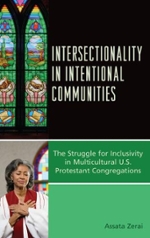
Assata Zerai
Over a decade of qualitative research, Assata Zerai has observed both incremental moves toward inclusiveness and strategies employed to accomplish long-term changes while conducting case studies of five multicultural Protestant churches in sites across the United States. With an interpretive approach, she explores these centers of worship and theorizes the conditions under which progressive social change occurs in some U.S. Protestant congregations. Understanding the daily practices of change and entrenchment in Protestant congregations and the intentional work to replace dominating structures with liberating ones may provide keys to creating multicultural, antiracist, feminist, and sexually inclusive volitional communities more broadly. Intersectionality in Intentional Communities argues that making a significant advance toward inclusion requires change in the underlying social structures of racism, sexism, heteronormativity, class, and other marginalizing influences. In order to isolate this phenomenon, Zerai conducted fieldwork and archival research among an African American and four multiracial U.S. churches. Different from a university or other public institution in which members are legally required to support diversity and related values, Zerai believes that volitional communities may provide a best-case scenario for how, motivated by higher ideals, members may find ways to create inclusive communities. Zerai’s research has a broad empirical base, encompassing five sites: a largely African American urban megachurch in the Midwest; a large Midwestern multiracial/multicultural church; a large urban multiracial/multicultural church in the eastern United States; a small, suburban Midwestern multiracial church; and an inclusive Midwestern college town church. In this book, Zerai further explores important connections between U.S. Protestant Christian congregations and political activism.
Available for purchase here.
Politica: Nuevomexicanos and American Political Incorporation, 1821-1910
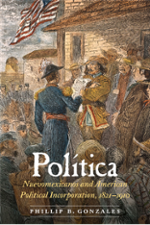
Phillip B. Gonzales
Política offers a stunning revisionist understanding of the early political incorporation of Mexican-origin peoples into the U.S. body politic in the nineteenth century. Historical sociologist Phillip B. Gonzales reexamines the fundamental issue in New Mexico’s history, namely, the dramatic shift in national identities initiated by Nuevomexicanos when their province became ruled by the United States.
Gonzales provides an insightful, rigorous, and controversial interpretation of how Nuevomexicano political competition was woven into the Democratic and Republican two-party system that emerged in the United States between the 1850s and 1912, when New Mexico became a state. Drawing on newly discovered archival and primary sources, he explores how Nuevomexicanos relied on a long tradition of political engagement and a preexisting republican disposition and practice to elaborate a dual-party political system mirroring the contours of U.S. national politics.
Política is a tour de force of political history in the nineteenth-century U.S.–Mexico borderlands that reinterprets colonization, reconstructs Euro-American and Nuevomexicano relations, and recasts the prevailing historical narrative of territorial expansion and incorporation in North American imperial history. Gonzales provides critical insights into several discrete historical processes, such as U.S. racialization and citizenship, integration and marginalization, accommodation and resistance, internal colonialism, and the long struggle for political inclusion in the borderlands, shedding light on debates taking place today over Latinos and U.S. citizenship.
Available for purchase here.
A Shared Future: Faith-Based Organizing for Racial Equity and Ethical Democracy
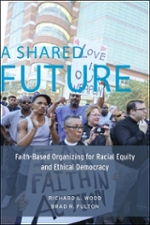
Richard L. Wood
Brad R. Fulton
Faith-based community organizers have spent decades working for greater equality in American society, and more recently have become significant players in shaping health care, finance, and immigration reform at the highest levels of government.
In A Shared Future, Richard L. Wood and Brad R. Fulton draw on a new national study of community organizing coalitions and in-depth interviews of key leaders in this field to show how faith-based organizing is creatively navigating the competing aspirations of America’s universalist and multiculturalist democratic ideals, even as it confronts three demons bedeviling American politics: economic inequality, federal policy paralysis, and racial inequity. With a broad view of the entire field and a distinct empirical focus on the PICO National Network, Wood and Fulton’s analysis illuminates the tensions, struggles, and deep rewards that come with pursuing racial equity within a social change organization and in society. Ultimately, A Shared Future offers a vision for how we might build a future that embodies the ethical democracy of the best American dreams.
An interview of the authors on the subject of faith leaders organizing for justice (Peace Talks Radio, copyright Good Radio Shows, Inc.) can be heard at this link: https://beta.prx.org/stories/190030
Available for purchase here.
Nonviolent Struggle: Theories, Strategies, and Dynamics
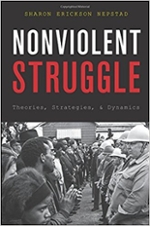
Sharon Erickson Nepstad
From Gandhi's movement to win Indian independence to the Arab Spring uprisings of 2011, an expanding number of citizens have used nonviolent action to win political goals. While such events have captured the public imagination, they have also generated a new surge of scholarly interest in the field of nonviolence and civil resistance studies. Although researchers have produced new empirical data, theories, and insights into the phenomenon of nonviolent struggle, the field is still quite unfamiliar to many students and scholars.
In Nonviolent Struggle: Theories, Strategies, and Dynamics, sociologist Sharon Nepstad provides a succinct introduction to the field of civil resistance studies, detailing its genesis, key concepts and debates, and a summary of empirical findings. Nepstad depicts the strategies and dynamics at play in nonviolent struggles, and analyzes the factors that shape the trajectory and outcome of civil resistance movements. The book draws on a vast array of historical examples, including the U.S. civil rights movement, the Indonesian uprising against President Suharto, the French Huguenot resistance during World War II, and Cesar Chavez's United Farm Workers. Nepstad describes both principled and pragmatic nonviolent traditions and explains various categories of nonviolent action, concluding with an assessment of areas for future research.
Available for purchase here.
Contesting Intersex: The Dubious Diagnosis

Georgiann Davis
Winner, 2017 Distinguished Book Award from the American Sociological Association, Section on Sex and Gender
Winner, 2016 Donald Light Award for the Applied or Public Practice of Medical Sociology from the American Sociological Association, Section on Medical Sociology
In Contesting Intersex, Davis draws on interviews with intersex people, their parents, and medical experts to explore the oft-questioned views on intersex in medical and activist communities, as well as the evolution of thought in regards to intersex visibility and transparency. She finds that framing intersex as an abnormality is harmful and can alter the course of one’s life. In fact, controversy over this framing continues, as intersex has been renamed a ‘disorder of sex development’ throughout medicine. This happened, she suggests, as a means for doctors to reassert their authority over the intersex body in the face of increasing intersex activism in the 1990s and feminist critiques of intersex medical treatment. Davis argues the renaming of ‘intersex’ as a ‘disorder of sex development’ is strong evidence that the intersex diagnosis is dubious. Within the intersex community, though, disorder of sex development terminology is hotly disputed; some prefer not to use a term which pathologizes their bodies, while others prefer to think of intersex in scientific terms. Although terminology is currently a source of tension within the movement, Davis hopes intersex activists and their allies can come together to improve the lives of intersex people, their families, and future generations. However, for this to happen, the intersex diagnosis, as well as sex, gender, and sexuality, needs to be understood as socially constructed phenomena. A personal journey into medical and social activism, Contesting Intersex presents a unique perspective on how medical diagnoses can affect lives profoundly.
Available for purchase here.
Mapping "Race": Critical Approaches to Health Disparities Research
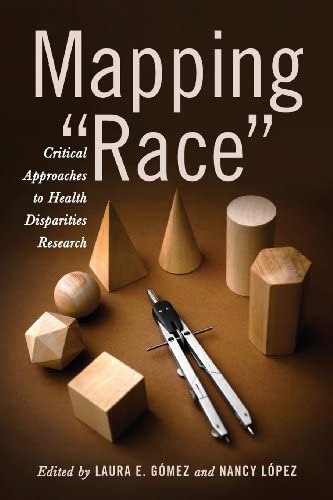
Laura E. Gomez and Nancy López
Researchers commonly ask subjects to self-identify their race from a menu of preestablished options. Yet if race is a multidimensional, multilevel social construction, this has profound methodological implications for the sciences and social sciences. Race must inform how we design large-scale data collection and how scientists utilize race in the context of specific research questions. This landmark collection argues for the recognition of those implications for research and suggests ways in which they may be integrated into future scientific endeavors. It concludes on a prescriptive note, providing an arsenal of multidisciplinary, conceptual, and methodological tools for studying race specifically within the context of health inequalities.
Available for purchase here.
Hypermasculinity and State Violence in Zimbabwe: An Africana Feminist Analysis of Maternal and Child Health
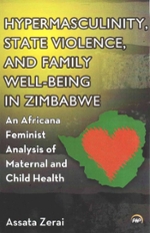
Assata Zerai
In Hypermasculinity and State Violence in Zimbabwe Undermining Family Well-Being: An Africana Feminist Analysis of Maternal and Child Health, Assata Zerai explores the demography of maternal and child health in Southern Africa from an Africana feminist sociological perspective. She presents a framework that considers the ways that nation, race, class, gender, sexuality, globalization, and other dimensions of oppression intersect to impact upon the experiences and agency of individuals and groups with health care and social support in Zimbabwe. She analyzes data sets from demographic and health surveys for the country. On the basis of the Africana feminist framework, Zerai argues that maternal and child health cannot be understood unless the socioeconomic, political, and cultural contexts are taken into account. She extends and tests the hypothesis that militarism (especially state violence) and hypermasculinity in Zimbabwe have deleterious effects on family well-being in general, and especially on maternal and child health.
Available for purchase here.
Knowledge in the Time of Cholera: The Struggle over American Medicine in the Nineteenth Century

Owen Whooley
These cholera outbreaks raised fundamental questions about medical knowledge and its legitimacy, giving fuel to alternative medical sects that used the confusion of the epidemic to challenge both medical orthodoxy and the authority of the still-new American Medical Association. In Knowledge in the Time of Cholera, Owen Whooley tells us the story of those dark days, centering his narrative on rivalries between medical and homeopathic practitioners and bringing to life the battle to control public understanding of disease, professional power, and democratic governance in nineteenth-century America.
Available for purchase here.
Nonviolent Revolutions: Civil Resistance in the Late Twentieth Century
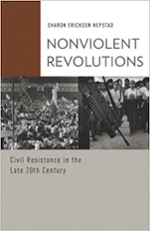
Sharon Erickson Nepstad
Winner of the 2012 Outstanding Book Award for the American Sociological Association, Section on Peace, War, and Social Conflict
In the spring of 1989, Chinese workers and students captured global attention as they occupied Tiananmen Square, demanded political change, and were tragically suppressed by the Chinese army. Months later, East German civilians rose up nonviolently, brought down the Berlin Wall, and dismantled their regime. Although both movements used tactics of civil resistance, their outcomes were different. Why?
In Nonviolent Revolutions, Sharon Erickson Nepstad examines these and other uprisings in Panama, Chile, Kenya, and the Philippines. Taking a comparative approach that includes both successful and failed cases of nonviolent resistance, Nepstad analyzes the effects of movements' strategies along with the counter-strategies regimes developed to retain power. She shows that a significant influence on revolutionary outcomes is security force defections, and explores the reasons why soldiers defect or remain loyal and the conditions that increase the likelihood of mutiny. She then examines the impact of international sanctions, finding that they can at times harm movements by generating new allies for authoritarian leaders or by shifting the locus of power from local civil resisters to international actors.
Available for purchase here.
The Fibromyalgia Story Medical Authority and Women's Worlds of Pain

Kristin Barker
More than six million Americans—most of them women—have been diagnosed with fibromyalgia syndrome (FMS), a disorder that produces muscular-skeletal pain and fatigue. In the absence of visible evidence, a well-understood cause, or effective treatment, many have questioned whether FMS is a "real" illness. Amidst the controversy, millions of women live with their very real symptoms.
Rather than taking sides in the heated debate, Kristin Barker explains how FMS represents an awkward union between the practices of modern medicine and the complexity of women's pain. Using interviews with sufferers, Barker focuses on how the idea of FMS gives meaning and order to women beset by troubling symptoms, self-doubt, and public skepticism.
The Fibromyalgia Story offers a fresh look at a controversial diagnosis; Barker avoids overly simplistic explanations and empathizes with sufferers without losing sight of the social construction of disease and its relation to modern medical practice.
Available for purchase here.
Reggaeton
Rivera, Raquel Z., Wayne Marshall, and Deborah Pacini Hernandez, eds.
A hybrid of reggae and rap, reggaeton is a music with Spanish-language lyrics and Caribbean aesthetics that has taken Latin America, the United States, and the world by storm. Superstars—including Daddy Yankee, Don Omar, and Ivy Queen—garner international attention, while aspiring performers use digital technologies to create and circulate their own tracks. Reggaeton brings together critical assessments of this wildly popular genre. Journalists, scholars, and artists delve into reggaeton’s local roots and its transnational dissemination; they parse the genre’s aesthetics, particularly in relation to those of hip-hop; and they explore the debates about race, nation, gender, and sexuality generated by the music and its associated cultural practices, from dance to fashion.
Available for purchase here.
Religion and War Resistance in the Plowshares Movement

Sharon Erickson Nepstad
Winner of the 2009 Outstanding Book Award for the American Sociological Association, Section on Peace, War, and Social Conflict
As the nuclear arms race exploded in the 1980s, a group of U.S. religious pacifists used radical nonviolence to intervene. Armed with hammers, they broke into military facilities to pound on missiles and pour blood on bombers, enacting the prophet Isaiah’s vision: “Nations shall beat their swords into plowshares and their spears into pruning hooks.” Calling themselves the Plowshares movement, these controversial activists received long prison sentences; nonetheless, their movement grew and expanded to Europe and Australia. In this book, Sharon Erickson Nepstad documents the emergence and international diffusion of this unique form of high-risk collective action. Drawing on in-depth interviews, original survey research, and archival data, Nepstad explains why some Plowshares groups have persisted over time while others have struggled or collapsed. Comparing the U.S. movement with less successful Plowshares groups overseas, Nepstad reveals how decisions about leadership, organization, retention, and cultural adaptations influence movements’ long-term trajectories.
Available for purchase here.
Convictions of the Soul: Religion, Culture and Agency in the Central America Solidarity Movement

Sharon Erickson Nepstad
Many U.S. Christians were profoundly moved by the liberation struggles in Central America in the 1980s. Most learned about the situation from missionaries who had worked in the area and witnessed the repression firsthand. These missionaries, Sharon Erickson Nepstad shows, employed the institutional and cultural resources of Christianity to seize the attention of American congregations and remind them of the moral obligations of their faith. Drawing on archival data and in-depth interviews with activists in ten separate solidarity organizations around the country, Nepstad offers a rich analysis of the experiences of religious leaders and church members in the solidarity movement. She explores the moral meaning of protest and the ways in which clergy used religious rituals, martyr stories, and biblical teachings to establish a link between faith and activism. She looks at the factors that transformed missionaries into skilled leaders who were able to translate the Central American conflicts into Christian themes and a religious language familiar to U.S. congregations. She also offers insights into the unique challenges of organizing on the transnational level and shows how the solidarity movement made U.S. policy towards Central America one of the most hotly contested issues in American politics during the 1980s. Unpacking the implications of her study for the field of collective action, Nepstad stresses the importance of the individual human agents who shape, and are shaped by, the structures and cultures in which they operate. She argues that working in and through the church gave supporters of solidarity moral credibility as well as a rich source of symbolic, human, and material resources that enabled them to reach across national boarders, motivating others to act upon their deeply held moral convictions. Shedding new light on the genesis and evolution of this important activist movement, Convictions of the Soul will be of interest to students and scholars of social movements, religion, and politics.
Available for purchase here.
Hopeful Girls, Troubled Boys Race and Gender Disparity in Urban Education
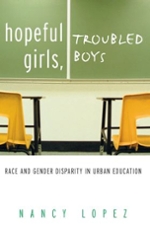
Nancy López
By 2007, it is estimated that 9.2 million girls of color will be enrolled in college compared to 6.9 million boys of color. Why the discrepancy? In Hopeful Girls, Troubled Boys, Nancy López takes us to the schools, homes and workplaces of Caribbean youth to point out the different expectations that guide behavior. Now the largest immigrant group in New York City, López focuses in particular on these Caribbean teens to explain how and why our schools and cities are failing boys of color. This is a fascinating ethnographic study on a topic of increasing interest to people in the field of education and anyone concerned about the future of young people.
Available for purchase here.
New York Ricans from the Hip Hop Zone
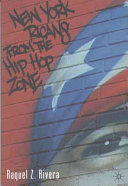
Raquel Z. Rivera
New York Puerto Ricans have been an integral part of hip hop culture since day one: from 1970s pioneers like Rock Steady Crew's Jo-Jo, to recent rap mega-stars Big Punisher (R.I.P.) and Angie Martinez. Yet, Puerto Rican participation and contributions to hip hop have often been downplayed and even completely ignored. And when their presence has been acknowledged, it has frequently been misinterpreted as a defection from Puerto Rican culture and identity, into the African American camp. But nothing could be further from the truth. Through hip hop, Puerto Ricans have simply stretched the boundaries of Puerto Ricanness and latinidad.
Available for purchase here.
Faith in Action: Religion, Race, and Democratic Organizing in America
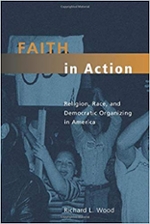
Richard L. Wood
Over the past fifteen years, associations throughout the U.S. have organized citizens around issues of equality and social justice, often through local churches. But in contrast to President Bush’s vision of faith-based activism, in which groups deliver social services to the needy, these associations do something greater. Drawing on institutions of faith, they reshape public policies that neglect the disadvantaged.
To find out how this faith-based form of community organizing succeeds, Richard L. Wood spent several years working with two local groups in Oakland, California—the faith-based Pacific Institute for Community Organization and the race-based Center for Third World Organizing. Comparing their activist techniques and achievements, Wood argues that the alternative cultures and strategies of these two groups give them radically different access to community ties and social capital.
Creative and insightful, Faith in Action shows how community activism and religious organizations can help build a more just and democratic future for all Americans.
Available for purchase here.
Forced Sacrifice as Ethnic Protest The Hispano Cause in New Mexico and the Racial Attitude Confrontation of 1933

Phillip B. Gonzales
Forced Sacrifice as Ethnic Protest brings to light important aspects of identity politics by introducing "forced sacrifice" as a type of protest that ethnic minorities in the United States occasionally mount, particularly against liberal regimes in public institutions. Social science concepts and the literature on social sacrifice help define a spontaneous confrontation in which the protest crowd dramatically forces the institution to dismiss – that is, to sacrifice – one of its own agents as a symbolic concession to ethnic inequality and as a way to open up social reform. The Racial Attitude Confrontation of 1933, involving the Hispanos of New Mexico, is analyzed in terms of forced sacrifice. The Hispano cause is clarified as a significant tradition of ethnic mobilization that arose in the Southwest between the 1880s and the 1930s, revealing some key symbolic and instrumental elements of identity as minority groups mobilize for their interests.
Available for purchase here.
